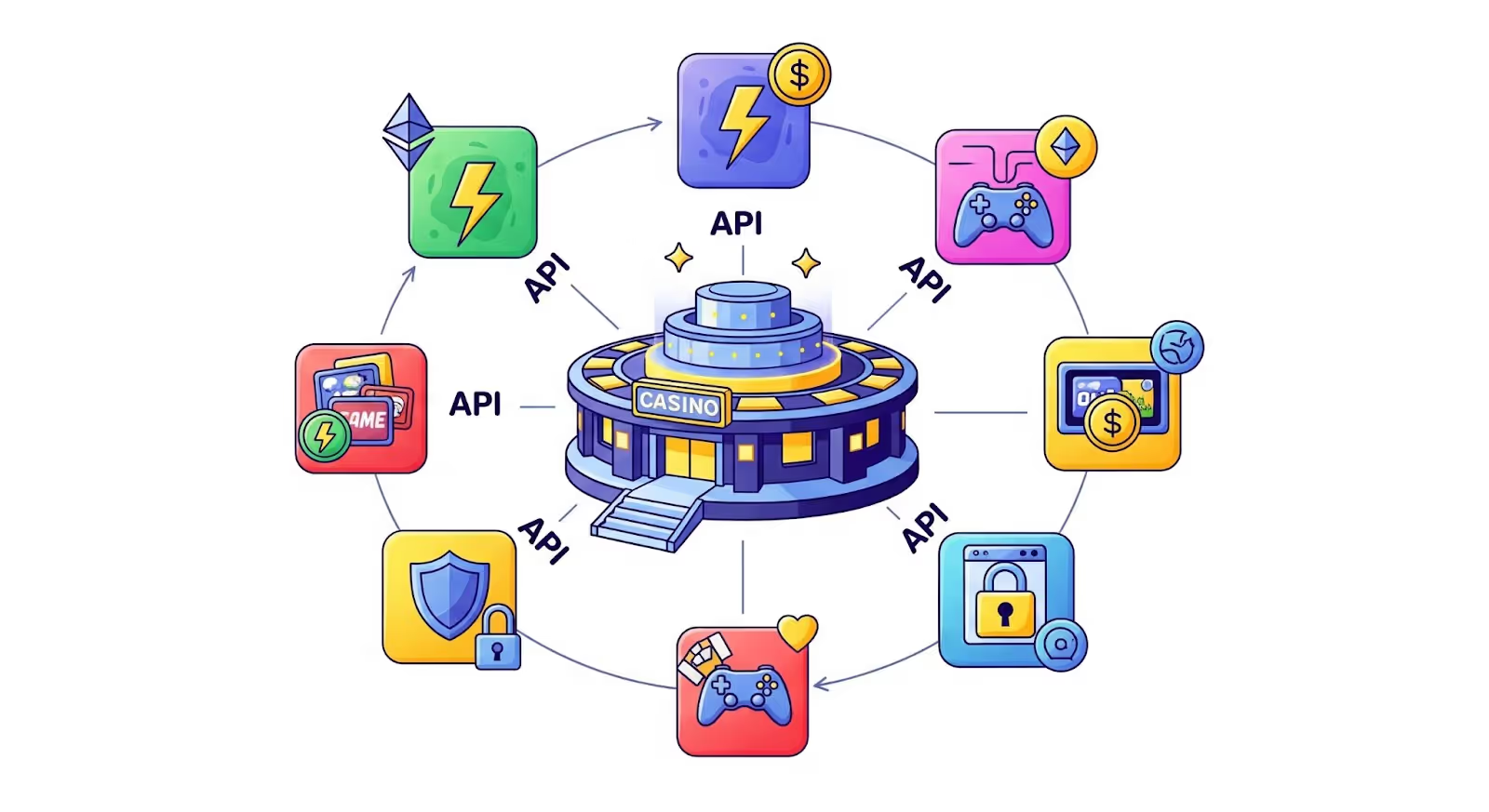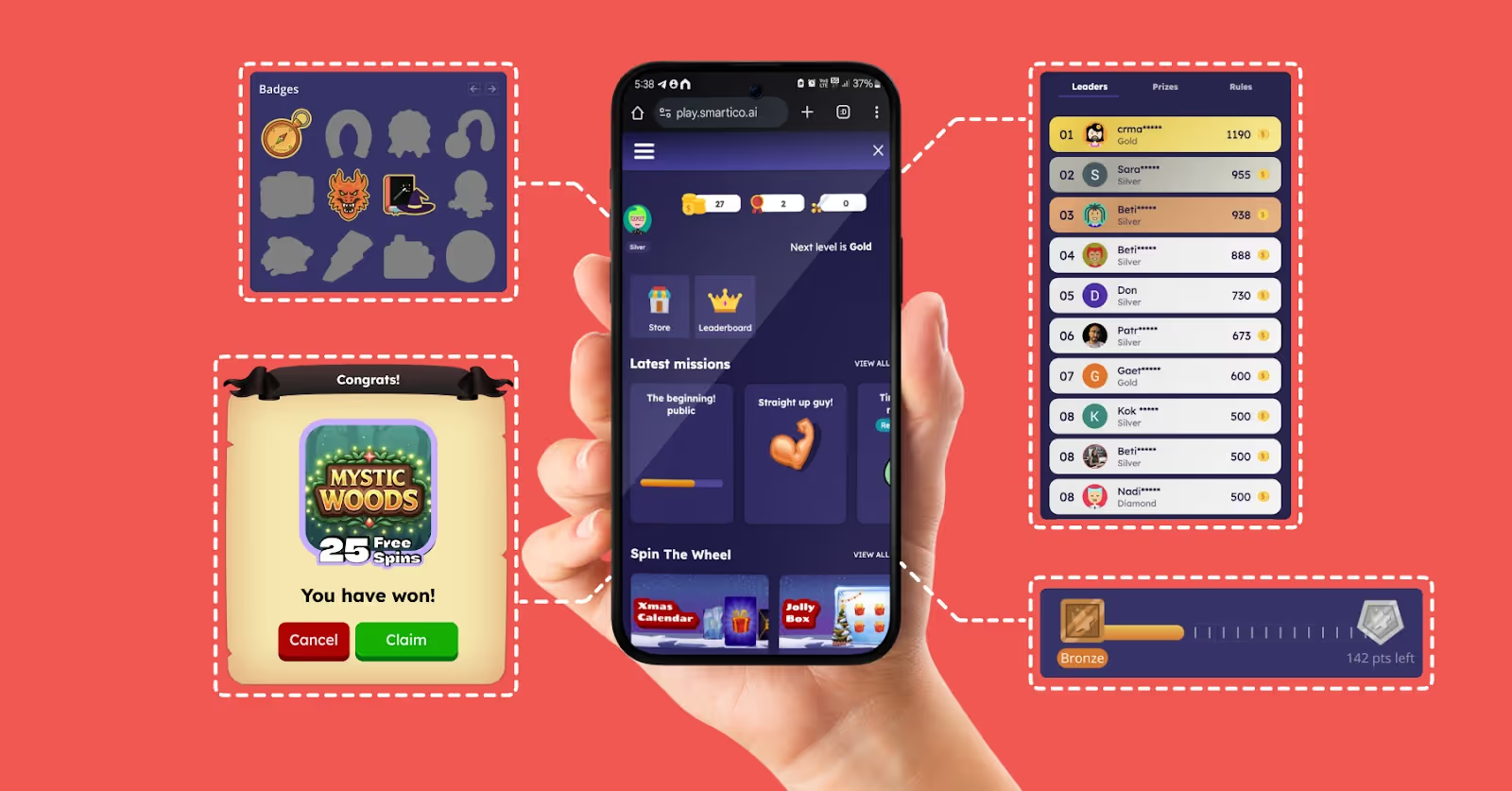Cryptocurrency Integration in Online Casinos: Complete Implementation Guide

The iGaming industry is racing to implement cryptocurrency, and with crypto casino bets hitting $26 billion in Q1 2025 alone, nearly doubling year-over-year, the message is clear: operators who don't embrace digital currency integration are watching their competitors cash in on the fastest-growing segment in online gaming.
Also, the global crypto casino market has exploded from $50 million in 2019 to $250 million in 2024, showing a staggering 38% compound annual growth rate. Meanwhile, traditional online casinos are struggling with the same old payment processor headaches, while crypto-enabled platforms process withdrawals in under 5 minutes.
But here's what most operators miss: crypto casino integration is about more than adding Bitcoin as a payment option. It's also about completely reimagining how players interact with your platform, from provably fair gaming to instant settlements that eliminate the friction that drives players away.
The Crypto Casino Revolution: More Than Payment Processing

The shift toward cryptocurrency in online gaming is all about solving the fundamental problems that have plagued the industry since its inception: trust, transparency, and transaction speed.
- Traditional casinos ask players to trust them. Crypto casinos let players verify everything themselves. Every spin, every bet, every outcome gets recorded permanently on the blockchain. Players can independently verify fairness using cryptographic proofs, eliminating the "just trust us" mentality that has driven skepticism in online gaming for decades.
- The technical foundation matters more than most realize. Blockchain technology uses cryptographic hashing to create tamper-proof records of every transaction. Each bet gets timestamped and linked to the previous transaction, creating an unbreakable chain of verification. When players can check the fairness of every game outcome in real-time, trust becomes mathematical rather than emotional.
- Transaction speed separates winners from losers. While traditional payment processors take 24-72 hours to process withdrawals, crypto transactions typically complete within 2-8 minutes. Some platforms are pushing this even further, with withdrawal times as fast as 4.9 minutes. More than a simple convenience, this speed advantage is becoming the baseline expectation for modern players.
Understanding the Crypto Casino Ecosystem

The crypto casino landscape operates on multiple layers, each serving specific functions in the player experience. Understanding these layers is key to proper implementation.
Layer 1: Blockchain Infrastructure
The foundation consists of blockchain networks that handle transaction processing. Bitcoin remains dominant with crypto bets in 2024, but its share is declining as faster alternatives gain traction. Ethereum processes the highest volume of casino deposits, while TRON dominates raw transaction volume.
Solana is emerging as a serious contender, especially for platforms requiring high-speed micro-transactions. Its low fees and fast processing make it ideal for high-frequency betting scenarios. The choice of blockchain affects everything from transaction costs to settlement speed, which makes it one of the most critical technical decisions in crypto casino development.
Layer 2: Smart Contract Systems
Smart contracts automate game logic and payout distribution without human intervention. These self-executing contracts eliminate the need for traditional payment processors and reduce operational costs by a significant margin. More importantly, they enable provably fair gaming where players can verify that outcomes weren't manipulated.
The implementation of smart contracts requires careful consideration of gas fees, execution speed, and security audits. Platforms using optimized smart contracts can process thousands of transactions per second while maintaining transparency and fairness.
Layer 3: Wallet Integration
Modern crypto casinos support multiple wallet types, from hot wallets for convenience to cold storage for security. The most successful platforms integrate with popular wallets like MetaMask, Trust Wallet, and WalletConnect. This allows players to connect and start playing within minutes.
Wallet integration affects user experience more than most operators realize. Smooth wallet connections reduce friction, while complex setup procedures drive players away. The best implementations allow players to connect their existing wallets without creating new accounts or going through lengthy verification processes.
Technical Implementation: Building Your Crypto Casino Infrastructure

Setting up a successful crypto casino calls for more than adding Bitcoin support to an existing platform. It demands a complete rethinking of system architecture, security protocols, and user experience design.
Choosing Your Technical Stack
Blockchain Selection Strategy
Your choice of blockchain networks directly impacts user experience and operational costs. Bitcoin offers the highest recognition and trust, but slow transaction times and high fees make it less suitable for high-frequency gaming. Ethereum provides extensive smart contract capabilities but faces scalability challenges during network congestion.
TRON has emerged as a popular choice for its low fees and fast processing, particularly for stablecoin transactions. Solana offers high-speed processing and low costs, which makes it ideal for micro-betting scenarios. Most successful platforms support multiple blockchains, allowing players to choose based on their preferences and fee tolerance.
Smart Contract Architecture
Smart contracts form the backbone of crypto casino operations, handling everything from game logic to payout distribution. The architecture must balance transparency with performance while maintaining security standards.
Random Number Generation (RNG) in smart contracts requires special attention. Traditional RNG systems rely on centralized servers, but crypto casinos use blockchain-based randomness that players can verify independently. This "provably fair" approach uses cryptographic hashing to ensure outcomes are truly random and unmanipulated.
Payment Gateway Integration
Modern crypto payment gateways like B2BinPay, CoinGate, and XAIGATE offer impressive solutions for managing multiple cryptocurrencies. These platforms handle the technical complexities of blockchain integration while providing APIs for smooth platform integration.
The best payment gateways offer features like automatic currency conversion, real-time exchange rates, and support for 100+ cryptocurrencies. They also provide compliance tools for KYC/AML requirements and reporting for tax purposes.
Security Implementation
Multi-Layer Security Architecture
Crypto casinos face unique security challenges that traditional platforms don't encounter. The irreversible nature of blockchain transactions means that security breaches can result in permanent fund loss. Successful platforms implement multiple security layers to protect both operator and player funds.
Hot wallet security requires continuous monitoring and automatic fund transfers to cold storage when predetermined thresholds are reached. Cold storage systems keep the majority of funds offline, protecting them from online attacks. Multi-signature wallets require multiple authorized signatures before funds can be moved, adding an extra layer of protection.
SSL/TLS Encryption
All communications between players and the platform must use end-to-end encryption. SSL/TLS certificates protect sensitive data during transmission, while advanced encryption standards secure stored information. The best platforms use military-grade encryption that would make government agencies jealous.
Smart Contract Auditing
Every smart contract must undergo thorough security audits before deployment. Professional auditing firms examine code for vulnerabilities, logic errors, and potential exploits. Regular audits ensure that contracts remain secure as the platform evolves and new features are added.
{{cta-banner}}
Game Integration and Provably Fair Systems
The gaming experience in crypto casinos differs fundamentally from traditional online gaming. Provably fair systems allow players to verify the fairness of every outcome, creating unprecedented transparency in online gaming.
Provably Fair Implementation
Provably fair gaming uses cryptographic algorithms to generate game outcomes that players can independently verify. The system works by combining a server seed (known only to the operator), a client seed (provided by the player), and a nonce (a number that changes with each game) to create a hash that determines the outcome.
Players can verify fairness by checking that the server seed hash matches the one published before the game and that the combination of seeds and nonce produces the claimed outcome. This mathematical verification eliminates the need to trust the operator's word about game fairness.
Live Dealer Integration
Crypto casinos can integrate live dealer games while maintaining blockchain transparency. The challenge lies in combining real-time human dealers with blockchain-based verification systems. Solutions include using multiple camera angles with blockchain-timestamped recordings and smart contracts that automatically verify dealer actions against predetermined rules.
Third-Party Game Providers
Many crypto casinos partner with established game providers who offer crypto-compatible versions of popular games. Providers like Evolution Gaming, NetEnt, and Pragmatic Play now offer games specifically designed for cryptocurrency platforms. These partnerships allow operators to offer thousands of games without developing them in-house.
Regulatory Compliance and Licensing

The regulatory situation for crypto casinos is complex and ever-changing. Understanding compliance requirements is vital for long-term success and avoiding legal complications.
Licensing Jurisdictions
Several jurisdictions have emerged as crypto-friendly licensing authorities. Curaçao remains the most popular choice, offering flexible regulations and reasonable costs. The Isle of Man and Malta provide more stringent oversight but offer greater regulatory certainty and better player protection.
Each jurisdiction has different requirements for operator qualifications, player protection measures, and compliance reporting. Operators must carefully evaluate which jurisdiction best fits their business model and target markets.
KYC/AML Compliance
Know Your Customer (KYC) and Anti-Money Laundering (AML) requirements vary significantly between jurisdictions. Some crypto casinos operate with minimal KYC requirements, while others implement comprehensive verification procedures.
The trend is toward increased regulatory scrutiny, with many jurisdictions implementing stricter requirements for customer verification and transaction monitoring. Operators must balance compliance requirements with the anonymity expectations of crypto users.
Tax Obligations
Crypto casino operators face complex tax obligations that vary by jurisdiction. Revenue from crypto operations may be subject to different tax treatment than traditional currency revenue. Professional tax advice is essential for ensuring compliance and optimizing tax efficiency.
Marketing and Player Acquisition

Crypto casinos face unique marketing challenges and opportunities. The target audience differs significantly from traditional online casino players, requiring specialized approaches to reach and engage them.
Understanding the Crypto Player
Crypto casino players are typically younger, more tech-savvy, and value privacy and speed over traditional banking relationships. They expect instant transactions, transparent operations, and cutting-edge technology. Many are already involved in cryptocurrency trading and decentralized finance (DeFi) activities.
These players are often early adopters who appreciate innovation and are willing to try new platforms that offer superior technology and user experience. They're also more likely to be influenced by social proof from crypto communities and forums.
Community Building
Successful crypto casinos build strong communities around their platforms. This includes active Discord servers, Telegram groups, and social media presence. Community engagement goes beyond marketing, as it creates loyal players who become advocates for the platform.
Regular tournaments, exclusive events, and community rewards help maintain engagement and encourage player retention. The best platforms treat their communities as partners rather than just customers.
Influencer Partnerships
Crypto casinos often partner with cryptocurrency influencers and content creators to reach their target audience. These partnerships can include sponsored content, affiliate programs, and exclusive promotional events. The key is finding influencers whose audiences align with the platform's target demographic.
Revenue Models and Monetization

Understanding crypto casino revenue models is essential for building sustainable businesses. The unique characteristics of cryptocurrency transactions create both opportunities and challenges for monetization.
House Edge Optimization
Like traditional casinos, crypto casinos profit from the house edge built into games. However, the transparency required by crypto players means that house edges must be clearly disclosed and competitively priced. Players can easily compare house edges across platforms, making competitive pricing essential.
The most successful platforms optimize house edges by game type and player segment. High-volume players might receive better odds, while promotional events can feature reduced house edges to drive engagement.
Transaction Fee Revenue
Some crypto casinos generate revenue from transaction fees, particularly on withdrawals. However, this approach requires careful balance – fees that are too high drive players away, while fees that are too low may not cover operational costs.
The trend is toward eliminating or minimizing transaction fees, with platforms instead focusing on increased volume and player retention. Some platforms absorb blockchain network fees as a competitive advantage.
Native Token Economies
Many crypto casinos create their own native tokens that players can use for gaming and receive as rewards. These tokens can be staked for additional benefits, used in governance voting, or traded on external exchanges. Native tokens create additional revenue streams while building player loyalty.
Successful token economies require careful economic design to maintain token value and prevent inflation. The best implementations create genuine utility for tokens while avoiding regulatory issues associated with securities.
Technology Integration: APIs and Third-Party Services

Modern crypto casinos rely on sophisticated technology stacks that integrate multiple third-party services. Understanding these integrations is crucial for building scalable and maintainable platforms.
Payment Processing APIs
Crypto payment processors provide APIs that handle the technical complexities of blockchain transactions. These APIs manage wallet creation, transaction monitoring, and automatic currency conversions. The best processors offer comprehensive documentation and developer support to streamline integration.
Integration considerations include error handling, transaction confirmations, and handling blockchain network congestion. Robust systems include fallback mechanisms and retry logic to ensure transaction reliability.
Game Provider APIs
Most crypto casinos integrate with multiple game providers through standardized APIs. These integrations allow platforms to offer thousands of games without developing them in-house. The challenge lies in managing multiple provider relationships while maintaining consistent user experience.
Successful integrations require careful attention to session management, bonus integration, and financial reconciliation. The best platforms create unified player experiences that mask the complexity of multiple provider integrations.
Compliance and Monitoring Tools
Crypto casinos use specialized tools for compliance monitoring and reporting. These tools track player behavior, identify suspicious activities, and generate reports for regulatory authorities. Integration with these tools must be seamless to avoid disrupting player experience.
Player Experience and Interface Design

The user experience in crypto casinos must balance the technical requirements of blockchain integration with the simplicity that players expect. This creates unique design challenges that don't exist in traditional online casinos.
Wallet Connection Workflows
The first interaction most players have with crypto casinos is connecting their wallet. This process must be intuitive and secure while handling the technical complexities of blockchain communication. The best implementations guide players through wallet connection without requiring technical knowledge.
Error handling becomes crucial when dealing with blockchain transactions. Clear error messages and recovery procedures help players understand and resolve issues without contacting support. Progressive disclosure techniques present complex information in digestible chunks.
Transaction History and Transparency
Crypto casino players expect complete transparency in their transaction history. This includes not just deposits and withdrawals, but also detailed game history with cryptographic verification. The challenge lies in presenting this information in an understandable format without overwhelming players.
Successful platforms provide multiple levels of detail, from simple transaction summaries to complete cryptographic proofs. Advanced users can access full blockchain data, while casual players see simplified transaction histories.
Mobile Optimization
The bigger part of crypto gaming activity occurs on mobile devices, which makes mobile optimization crucial for success. Mobile crypto wallets create additional complexity, as platforms must integrate with multiple wallet apps while maintaining security and user experience.
The best mobile implementations use responsive design that adapts to different screen sizes and wallet interfaces. Touch-optimized controls and simplified navigation help players manage their crypto transactions on smaller screens.
Security and Risk Management

Crypto casinos face unique security challenges that require specialized approaches to risk management. The irreversible nature of blockchain transactions means that security breaches can result in permanent losses.
Fund Security Architecture
Successful crypto casinos implement multi-tier security architectures that protect both operator and player funds. Hot wallets handle immediate transaction needs while maintaining minimal balances. Cold storage systems protect the majority of funds from online attacks.
Multi-signature wallets require multiple authorized signatures before funds can be moved, adding an extra layer of protection. Hardware security modules (HSMs) provide tamper-resistant storage for cryptographic keys and sensitive operations.
Player Protection Measures
Player protection in crypto casinos goes beyond traditional responsible gaming measures. Session limits and loss limits must work with volatile cryptocurrency values. Some platforms implement automatic conversion to stablecoins to protect players from currency fluctuations.
Two-factor authentication (2FA) becomes even more important in crypto casinos, as account compromise can result in irreversible fund loss. The best platforms require 2FA for all withdrawals and provide multiple authentication options.
Fraud Prevention
Crypto casinos use sophisticated fraud detection systems that analyze transaction patterns and player behavior. These systems must balance security with player privacy, as excessive monitoring can drive away privacy-conscious crypto users.
Machine learning algorithms identify suspicious patterns while minimizing false positives. The best systems adapt to new fraud techniques while maintaining high player satisfaction scores.
Future Trends and Emerging Technologies

The crypto casino industry continues to evolve rapidly, with new technologies and trends shaping the future of online gaming. Understanding these developments is crucial for long-term success.
Decentralized Autonomous Organizations (DAOs)
Some crypto casinos are experimenting with DAO governance models where players and token holders participate in platform decisions. These models can increase player engagement and create stronger communities, but they also introduce complexity in decision-making and legal liability.
NFT Integration
Non-fungible tokens (NFTs) are being integrated into crypto casinos as collectibles, rewards, and in-game assets. These implementations create new revenue streams and engagement opportunities, but they also require careful economic design to maintain value.
Layer 2 Solutions
Layer 2 blockchain solutions like Lightning Network and Polygon are being adopted to reduce transaction costs and increase speed. These solutions can process thousands of transactions per second while maintaining security and decentralization.
AI and Machine Learning
Artificial intelligence is being used to personalize player experiences, optimize game recommendations, and detect fraudulent activities. AI-powered chatbots provide instant customer support, while machine learning algorithms optimize bonus offers and promotional campaigns.
Smartico.ai: Changing Crypto Casino Engagement for the Better

While technology forms the foundation of successful crypto casinos, player engagement and retention separate market leaders from also-rans. This is where Smartico.ai emerges as the revitalizing solution that crypto casino operators have been waiting for.
The First Unified CRM and Gamification Platform
Smartico.ai stands as the first and leading unified Gamification and CRM Automation software specifically designed for the iGaming industry. Unlike generic CRM solutions that try to adapt to crypto casinos, Smartico was built from the ground up to understand the unique challenges and opportunities of cryptocurrency-based gaming platforms.
The platform combines real-time player data analysis with AI-powered personalization to create engagement strategies that actually work. While traditional CRMs treat crypto players like regular customers, Smartico understands that crypto enthusiasts expect speed, transparency, and cutting-edge technology in every interaction.
AI-Powered Player Intelligence
Smartico's AI models turn player data into actionable insights that drive retention and revenue growth. The platform's predictive modeling anticipates player behavior, identifies churn risks, and optimizes bonus delivery timing for maximum impact.
The churn prediction capabilities are particularly valuable for crypto casinos, where player acquisition costs continue to rise. By identifying at-risk players before they leave, operators can implement targeted retention campaigns that significantly improve lifetime value.
Gamification That Actually Engages
The platform's gamification tools go far beyond simple point systems. Smartico offers customizable missions, level-based progression, real-time leaderboards, and competitive tournaments that keep players engaged long after their initial deposit.
The marketplace feature allows players to redeem points for bonuses, free spins, or exclusive items, creating a complete economy within the casino platform. This approach transforms casual players into engaged community members who see the casino as more than just a place to play games.
Real-Time Automation and Personalization
Smartico's automation capabilities handle the complex task of personalizing player journeys at scale. The platform monitors player behavior in real-time and triggers appropriate responses automatically, from welcome sequences to re-engagement campaigns.
The multi-channel approach ensures that players receive personalized messages through their preferred communication channels, whether that's email, SMS, push notifications, or in-app messages. The AI optimizes both timing and channel selection for each individual player.
Smooth and Easy Integration with Crypto Platforms
Unlike generic CRM solutions that struggle with crypto casino integration, Smartico was designed specifically for the iGaming industry. The platform integrates easily with crypto payment systems, blockchain transactions, and digital wallet connection.
This native understanding of crypto casino operations means that Smartico can track and respond to blockchain transactions, cryptocurrency deposits, and digital wallet activities in real-time. The platform treats crypto transactions as first-class citizens rather than afterthoughts.
Partnership-Focused Approach
Smartico doesn't just provide software, it provides partnership. Each client receives dedicated success managers who guide strategy, provide training, and offer ongoing support throughout the entire relationship. This way, crypto casino operators can focus on their core business while Smartico handles the complexities of player engagement and retention.
Smartico’s approach to onboarding includes technical feasibility calls, comprehensive training, and ongoing support through dedicated Slack and Teams channels. This level of support is particularly valuable for crypto casinos, where technical complexity can create integration challenges.
Request Your Demo Today
For crypto casino operators ready to transform their player engagement and retention strategies, Smartico.ai offers all-round, in-depth demos that demonstrate the platform's capabilities using real data and actual backend systems. The demo process includes technical feasibility assessment and customization recommendations based on specific platform requirements.
The combination of high-end technology, industry-specific expertise, and partnership-focused support makes Smartico.ai the ideal solution for crypto casinos looking to maximize player lifetime value and build sustainable competitive advantages in the rapidly evolving digital gaming landscape.
Book your demo below, and find out how Smartico can help boost your revenue in no time.
{{cta-banner}}
Conclusion
Cryptocurrency integration in online casinos represents more than a technological upgrade—it's a fundamental reimagining of how players interact with gaming platforms. The statistics are clear: crypto casinos are growing faster than traditional platforms, offering superior user experiences, and capturing an increasing share of the online gaming market.
Success in this space requires more than simply adding Bitcoin payments to existing systems. It demands a complete understanding of blockchain technology, regulatory compliance, security implementation, and player expectations. The platforms that thrive will be those that embrace the transparency, speed, and innovation that crypto players demand.
The future belongs to operators who recognize that crypto casino integration isn't just about accepting digital currencies—it's about building the next generation of gaming platforms that deliver unprecedented transparency, security, and player control. Combined with advanced engagement platforms like Smartico.ai, crypto casinos can create gaming experiences that set new standards for the entire industry.
Frequently Asked Questions
What are the main advantages of integrating cryptocurrency into online casinos?
Cryptocurrency integration offers several key advantages: transaction speeds of 2-8 minutes compared to 24-72 hours for traditional methods, enhanced player privacy through pseudonymous transactions, lower operational costs due to reduced payment processor fees, global accessibility without banking restrictions, and provably fair gaming through blockchain verification. These benefits combine to create superior player experiences that drive engagement and retention.
Which cryptocurrencies should online casinos support?
The most important cryptocurrencies for casino integration are Bitcoin (52.8% market share), Ethereum (extensive smart contract capabilities), and TRON (low fees and fast processing). Stablecoins like USDT and USDC are increasingly popular due to reduced volatility. The best approach is supporting multiple cryptocurrencies to cater to different player preferences while focusing on the most widely adopted options.
How do provably fair gaming systems work in crypto casinos?
Provably fair systems use cryptographic algorithms to generate game outcomes that players can independently verify. The system combines a server seed (operator-controlled), client seed (player-provided), and nonce (game-specific number) to create a hash that determines outcomes. Players can verify fairness by checking that the server seed hash matches the pre-published version and that the seed combination produces the claimed result.
What regulatory considerations apply to crypto casino operations?
Crypto casinos must comply with licensing requirements in their operating jurisdictions, with popular options including Curaçao, Malta, and Isle of Man. Key compliance areas include KYC/AML procedures, responsible gaming measures, tax obligations, and transaction monitoring. Requirements vary significantly between jurisdictions, making legal consultation essential for proper compliance structure.
How do crypto casinos handle security and player fund protection?
Crypto casinos implement multi-tier security architectures including hot wallets for immediate transactions, cold storage for majority fund protection, multi-signature wallets requiring multiple authorizations, and hardware security modules for key storage. Additional measures include SSL/TLS encryption, smart contract auditing, and comprehensive fraud detection systems that balance security with player privacy expectations.
What are the typical transaction costs and processing times for crypto casinos?
Transaction costs vary by blockchain network, ranging from under $0.01 for TRON to $5-50 for Bitcoin during high congestion. Processing times typically range from 2-8 minutes for most cryptocurrencies, with some platforms achieving sub-5-minute withdrawals. These metrics significantly outperform traditional payment methods that often take 24-72 hours and charge 2-5% in processing fees.
How do crypto casinos implement responsible gaming measures?
Crypto casinos adapt traditional responsible gaming tools to work with cryptocurrency volatility, including deposit limits in both crypto and fiat equivalents, session time limits, loss limits with automatic stablecoin conversion, and self-exclusion options. Advanced platforms use AI to monitor player behavior patterns and implement automated interventions when concerning activity is detected.
What technical infrastructure is required for crypto casino integration?
Essential infrastructure includes blockchain node connectivity or third-party API integration, secure wallet management systems, smart contract development and auditing capabilities, payment gateway integration, and comprehensive security measures. Many operators choose specialized crypto casino platforms or payment processors to handle technical complexities while focusing on gaming operations and player acquisition.
Did you find this article helpful? If so, please consider sharing it with other industry professionals such as yourself.
Ready to use Smartico?
Join hundreds of businesses worldwide engaging players with Smartico.










